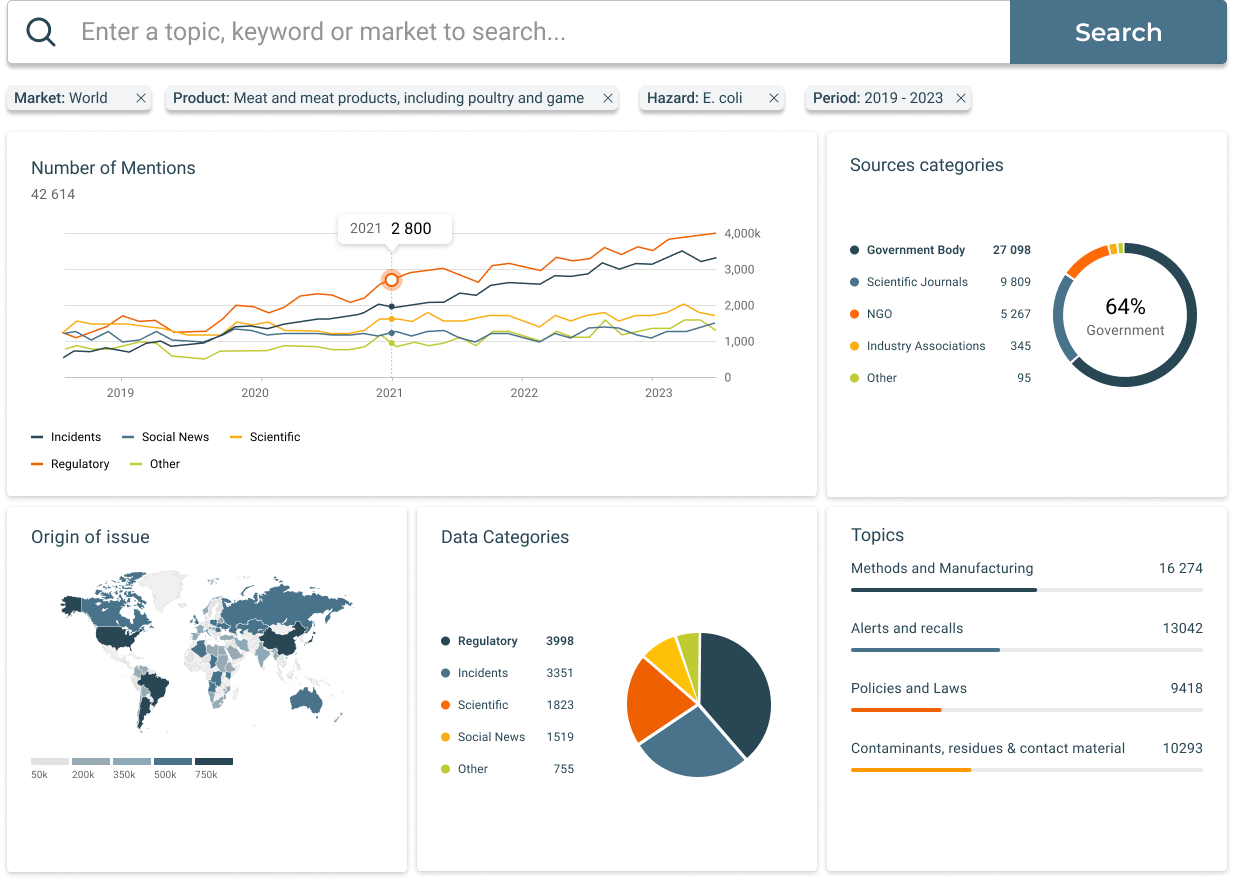Bread is a dietary staple worldwide, consumed daily by millions of people in various forms, from sliced loaves to specialty rolls and buns. Despite its simplicity, bread is subject to recalls due to contamination risks, allergens, mislabeling, and foreign material presence. Bread recalls are essential for protecting public health, especially when allergens or pathogens are involved. This guide explores the causes of bread recalls, regulatory oversight, the impact on the food industry, and preventive measures that can help ensure bread safety from production to sale. Let's dive into this type of Food Recall.
What is a Bread Recall?
A bread recall is the process of removing potentially unsafe bread products from the market due to contamination, mislabeling, or quality control issues. Recalls may be initiated voluntarily by the producer or mandated by regulatory bodies like the FDA. The goal is to prevent consumers from ingesting potentially harmful products, whether due to allergens, microbial contamination, or foreign materials.
Bread recalls can affect various types of products, including loaves, buns, baguettes, and even specialty or gluten-free bread varieties. Given bread's role as a daily staple, recalls are managed swiftly to minimize health risks to consumers and ensure safe distribution.
Main Causes and Hazards of Bread Recalls
Bread recalls are often triggered by one or more specific hazards, each posing unique risks to consumers:
-
Undeclared Allergens (e.g., Soy, Dairy, Nuts): Bread is commonly produced in facilities where multiple ingredients are handled, which can lead to cross-contamination with allergens such as milk, soy, or tree nuts. If these allergens are not declared on the label, they pose serious risks to consumers with food allergies, leading to recalls.
-
Microbial Contamination (e.g., Mold, Listeria): Bread, especially if improperly stored, can develop mold, which may produce mycotoxins harmful to health. In rare cases, bread contamination with Listeria can occur during processing, leading to recalls due to the potential for serious illness.
-
Foreign Materials (e.g., Plastic, Glass, Metal Fragments): Bread recalls may also be prompted by foreign materials accidentally entering the product due to equipment malfunctions or packaging errors. Such contaminants pose choking hazards and physical injury risks to consumers.
-
Mislabeling: Accurate labeling is essential, particularly for consumers with dietary restrictions or allergies. If labels on bread products incorrectly declare ingredients, such as gluten in gluten-free products, this can result in recalls to protect consumer health.
Understanding these causes highlights the importance of rigorous quality control measures throughout bread production to prevent contamination and ensure consumer safety.
Regulatory Authorities' Role in Bread Recalls
In the United States, the FDA is responsible for managing bread recalls, with additional support from the CDC if an outbreak or illness is linked to bread products. Key roles of regulatory authorities in bread recalls include:
-
Inspection and Monitoring: The FDA inspects bread manufacturing facilities to ensure compliance with hygiene, ingredient handling, and labeling standards. These inspections help detect contamination risks and verify allergen control protocols.
-
Recall Classification and Management: When a recall is necessary, the FDA classifies it based on risk:
- Class I Recall: High risk, involving products that could lead to serious health issues or death, such as bread contaminated with undeclared allergens or pathogens.
- Class II Recall: Moderate risk, where the product may cause temporary health issues but is unlikely to result in severe illness.
- Class III Recall: Low risk, involving products that violate labeling or regulatory standards but do not pose immediate health threats.
-
Public Notification: The FDA issues public notices for Class I and II recalls, providing information on affected products, lot numbers, and guidance for consumers. This communication is essential for ensuring that consumers avoid potentially unsafe products.
-
Corrective Actions and Follow-Up: After a recall, the FDA may require manufacturers to implement corrective measures, such as improving allergen management protocols or upgrading equipment. These actions help prevent future incidents and promote food safety.
The involvement of regulatory authorities ensures that bread recalls are conducted transparently and efficiently, safeguarding public health and maintaining trust in the food supply.
Impact of Bread Recalls on the Industry
Bread recalls can have significant consequences for producers, suppliers, and retailers. Key impacts include:
-
Financial Losses: Bread recalls generate direct costs from retrieving products, conducting tests, and implementing corrective actions. Additional financial losses may come from decreased consumer trust, lost sales, and potential legal liabilities if consumers are affected.
-
Damage to Brand Reputation: A bread recall, especially one involving allergens or pathogens, can harm a brand’s image. Rebuilding trust requires transparency and a commitment to improved safety practices.
-
Increased Regulatory Scrutiny: Following a recall, companies often face stricter monitoring from regulatory authorities, including more frequent inspections and additional compliance requirements. This added scrutiny may strain resources and impact business operations.
-
Supply Chain Disruption: Bread recalls disrupt the entire supply chain, from suppliers to retailers. Managing these disruptions requires effective coordination to ensure that affected products are removed and that safe products reach consumers.
Understanding these impacts underscores the importance of implementing preventive measures to maintain safety standards and protect both consumer health and brand reputation.
Preventive Measures for Bread Recalls
To reduce the likelihood of bread recalls, manufacturers should focus on robust quality control and allergen management throughout production. Key preventive measures include:
-
Good Manufacturing Practices (GMP): Following GMP standards helps ensure cleanliness, equipment maintenance, and employee hygiene in bread production facilities, reducing risks of contamination during processing.
-
Allergen Management and Label Verification: Accurate allergen labeling is essential for consumer safety. Implementing strict protocols to prevent cross-contact between allergens and non-allergenic products, along with routine label verification, helps prevent mislabeling-related recalls.
-
Regular Microbial Testing: Routine testing for mold and other microbial contaminants at various stages of production helps detect potential issues early, allowing for timely corrective actions.
-
Quality Control for Foreign Materials: Using equipment with metal detectors and conducting regular checks for packaging integrity helps minimize the risk of foreign materials ending up in bread products.
-
Employee Training on Food Safety Protocols: Ensuring employees are well-trained in food safety practices, including handling, hygiene, and allergen management, reduces the risk of contamination due to human error.
By incorporating these preventive practices, bread manufacturers can minimize the risk of recalls and protect consumer trust.
Conclusion
Bread recalls are essential to maintaining food safety, especially given the potential for allergen mislabeling, microbial contamination, and foreign materials in bread products. Understanding the main causes of bread recalls—ranging from allergen risks to quality control failures—allows manufacturers to implement proactive safety measures that ensure compliance with FDA standards.
For bread producers, successful recall management and preventive practices are critical to minimizing risks. By maintaining rigorous sanitation protocols, conducting regular testing, and verifying allergen labeling, companies can protect consumer health and uphold their brand’s reputation. Transparent communication with regulatory authorities and the public further supports a safer and more reliable food supply.
Last Month's Food Recalls and Safety Incidents
Explore the latest food recalls, market withdrawals, and safety alerts in our free Food Safety Incidents Dashboard. Updated monthly and powered by SGS Digicomply, this dashboard provides a clear, filterable list of last month’s global food recalls and incidents, allowing you to stay informed on the products and hazards affecting the industry.

How manufacturers and companies can track and utilize global recall data:
SGS Digicomply continuously monitors and analyzes millions of data sources across over 160 jurisdictions. With easy-to-use filters for sources, locations, products, substances, hazards, and more, our platform allows manufacturers to track recall trends and gain actionable insights powered by AI-Copilot.
Explore our interactive demos to see these tools in action.

By combining diverse data sources, SGS Digicomply offers the most comprehensive and targeted screening of food safety data, contextualized with real-time lab data to identify emerging risks.





.webp?width=1644&height=1254&name=Food%20Safety%20Dashboard%201%20(1).webp)
